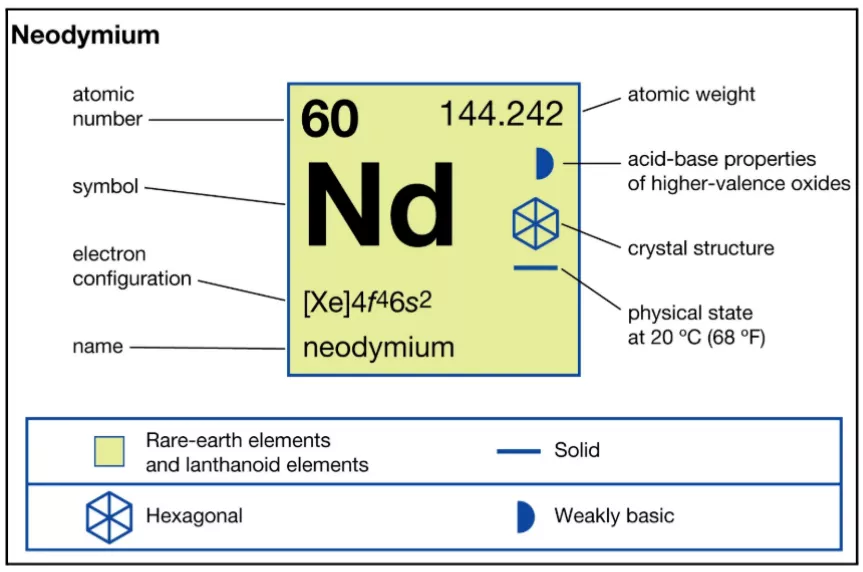India, through Indian Rare Earths Limited (IREL), plans a ninefold increase in neodymium production to 500 tonnes by FY27.Key Highlight on neodymium production in India
- Production Target: Neodymium output to rise from 40 tonnes in FY25 to 500 tonnes by FY27.
- Production is expected to reach 200 tonnes by the end of FY26.
About Neodymium
- Introduction: Neodymium (Nd) is a lustrous, silvery rare-earth element with atomic number 60, rare-earth metal.
About Indian Rare Earths Limited (IREL)
- IREL (India) Limited, established in 1950, is a Government of India enterprise under the Department of Atomic Energy.
- Role: It undertakes mining, processing, and refining of rare-earth elements, primarily from monazite-bearing sands.
- Production Facilities: It operates key facilities in Odisha (extraction) and Kerala (refining), driving India’s rare-earth value chain.
|
- Availability and Source: It occurs naturally in minerals like monazite and bastnasite, with major global deposits in China, the USA, Brazil, Australia, India, and Sri Lanka.
- India’s coastal monazite sands are an important source of neodymium and other rare-earth elements.
 Global Production: China dominates the global production of neodymium magnets, accounting for over 80% of the world’s supply followed by smaller contributions from the U.S. and Australia.
Global Production: China dominates the global production of neodymium magnets, accounting for over 80% of the world’s supply followed by smaller contributions from the U.S. and Australia.- Indian Reserves: India holds about 6% of global rare-earth reserves, largely along the coastal belts of Odisha, Kerala, and Tamil Nadu, managed mainly by IREL.
- Applications:
- High-Strength Magnets: Core material for permanent magnets used in electric vehicle (EV) motors, wind turbines, and drones.
- A neodymium magnet is made from an alloy of neodymium (~30%), iron(~ 68 %), and boron (~ 2%) that creates the strongest commercially available permanent magnets
- Strategic Industries: Crucial for defense guidance systems, communication equipment, and clean energy technologies.
Conclusion
This expansion will enhance India’s strategic autonomy in critical minerals, support indigenous clean energy and defense industries, and reduce dependence on Chinese rare-earth imports.
![]() 12 Nov 2025
12 Nov 2025

 Global Production: China dominates the global production of neodymium magnets, accounting for over 80% of the world’s supply followed by smaller contributions from the U.S. and Australia.
Global Production: China dominates the global production of neodymium magnets, accounting for over 80% of the world’s supply followed by smaller contributions from the U.S. and Australia.